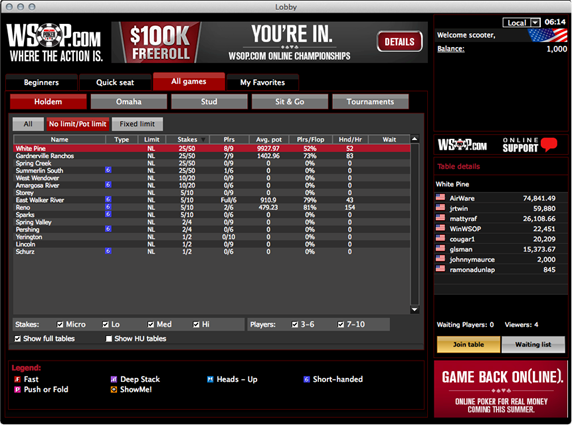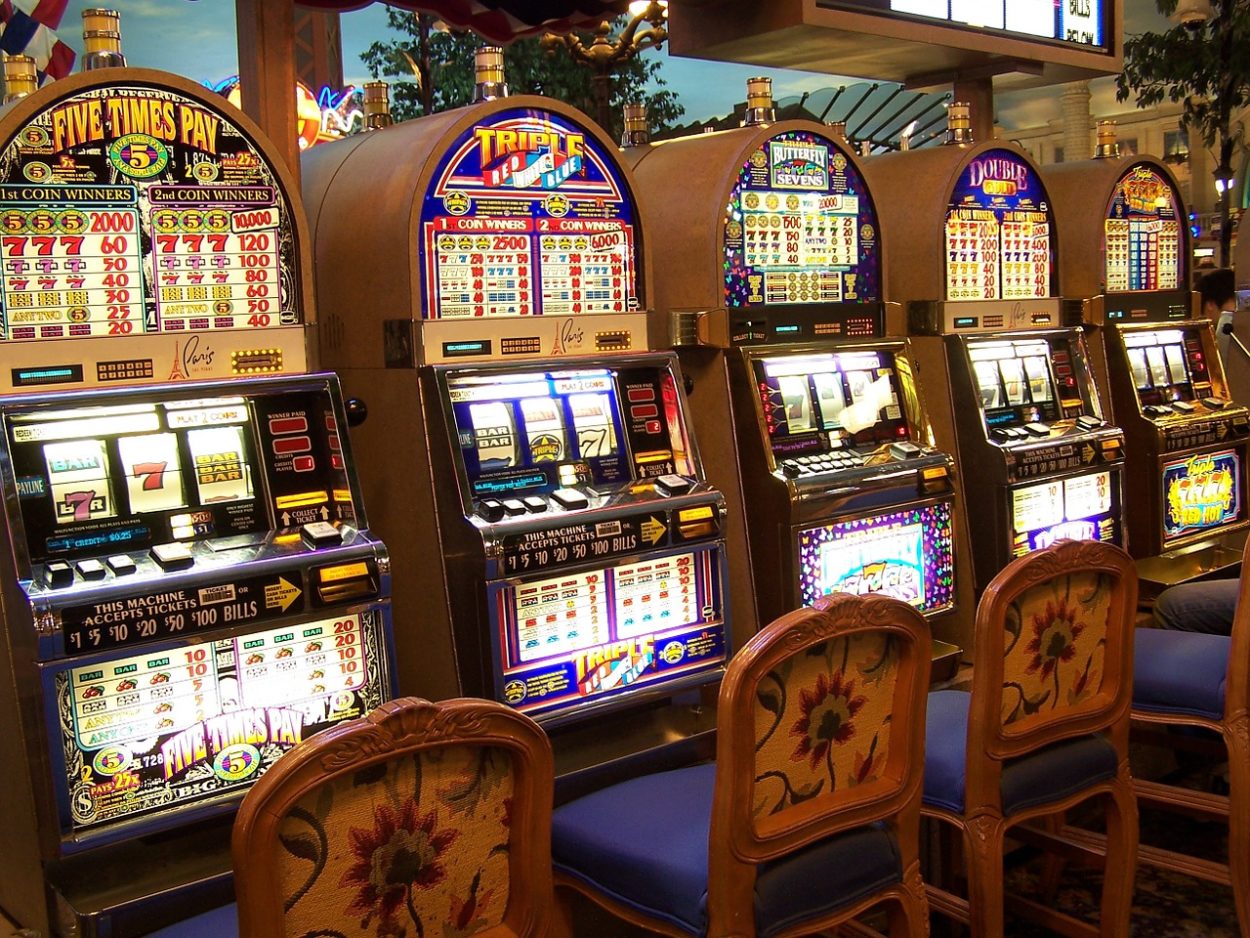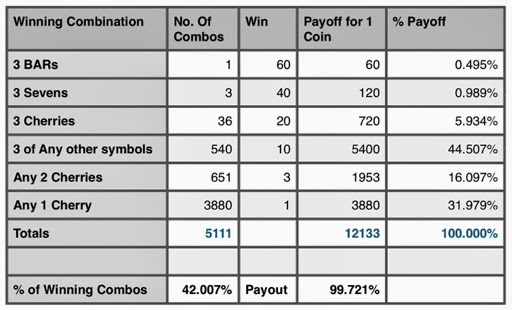The Probability Of Winning On A Slot Machine Is 8
Dec 13, 2015 $200 no deposit bonus for Ruby Slots Casino. Your bonus code: TRYME200 $200 No deposit bonus 30X Playthrough $100 Max Cash out. If your last transaction was a no deposit bonus then be sure to make a deposit before claiming this one or your winnings will. 
Today, the mathematics of slot machines. The University of Houston mathematics department presents this program about the machines that make our civilization run, and the people whose ingenuity created them.
- The Probability Of Winning On A Slot Machine Is 8 5
- The Probability Of Winning On A Slot Machine Is 8 6
- The Probability Of Winning On A Slot Machine Is 8 0
- The Probability Of Winning On A Slot Machine Is 8 3
- The Probability Of Winning On A Slot Machine Is 8 2
If you are playing a slot machine with 5 reels with 20 symbols on each reel, in theory there would be 3.2 million different combinations that could show up. The probability of each winning. Probability of slot machine. Up vote 1 down vote favorite. A person is doing 3 trials in 2 slot machines A and B. The chance of winning in machine A is 0.4 and in B is 0.2. In the first trial, this person choose the machine at random. In each stage, if he wins, he would again choose the same machine, else he chooses the other machine. What Are the Odds of Winning on a Slot Machine? Slot machine odds used to be easy to calculate. When you’re dealing with three reels, ten symbols on each reel, and a limited pay table, then it’s just a simple math problem. But the rise of electromechanical slot machines and (later) video slots added some complexity to the situation. Dan from Communication Group 34 takes you through the rules and mathematics of Casino slot Machines! The Rules and Maths Behind Slot Machines. MAJOR WINNING ON SKY RIDER 2 SLOT MACHINE. Jul 20, 2017 You must know both the probability of winning and the payout when you win to make this calculation. How Progressive Jackpots Work. You’ve probably seen slot machine games with huge jackpots that seem to constantly be growing. These are progressive jackpot games, and they work slightly differently than a standard slot machine game.
Mathematicians first got interested in randomness by studying games of chance. Ever since, the histories of mathematics and gambling have been intertwined. Clever gamblers use mathematics to look for the smallest advantages, and casinos use sophisticated mathematical tools to devise new ways of drawing in players.
The Probability Of Winning On A Slot Machine Is 8 5
Indeed, a patent granted to the Norwegian mathematician Inge Telnaes in 1984 transformed the gambling industry. Prior to Telnaes’ invention, slot machines were essentially mechanical devices. Besides being difficult to tune and maintain, mechanical slot machines suffered from an essential problem: Let’s look at a machine with three reels, each with 12 symbols, with one of those 12 symbols a cherry. The likelihood of getting three cherries, and winning the jackpot, is 1 in 1,728. If the casino wants to make money, the jackpot payout should be, say $1,700 on a $1 bet. That does not seem attractive by today’s standards. However, the only way to increase the payout is to decrease the chances of hitting a jackpot.
Adding another reel is a possibility. For instance adding a fourth reel in the previous example would get us to a jackpot of about $20,000. But people do not like machines with more reels — they intuitively, and rightfully, feel that extra reels diminish their chance of winning. Another possibility is to put more symbols on each reel. But the astronomical jackpots you see in casinos today would then require truly enormous machines.
Inge Telnaes proposed a simple solution: Let a random number generator — a computer chip — determine the combination of symbols that appear when the reels stop. In other words, use a chip to control where the reels stop on a spin, but create the illusion that the wheels stopped on their own. The number of possible outcomes on the slot machine does not change. However, by reprogramming the chip, the operator has full control over the likelihood of each of the different outcomes. For instance, the operator could make the three cherries appear only once in a million spins.
This was a brilliant insight: Suppose I pick a number between one and a million. Would you be willing to bet that you can guess that number? The answer is probably not. But let a computer chip pick such a number, put the chip in a machine with blinking lights and spinning reels, and many people will be more than willing to make the bet. It is simply because what people assume is happening in a slot machine is very different from what is actually happening.
The Magician oil painting by Hieronymus Boschfrom between 1475 and 1480
The history of gambling is also intertwined with that of a less reputable group — tricksters and swindlers. In the long run, the only sure way to make money by gambling is to create the illusion that your opponent can win, while keeping the odds firmly on your side. And that gives those who know math a very solid advantage.
I'm Krešimir Josić, at the University of Houston, where we're interested in the way inventive minds work.

NOTE: In the example with three cherries, I assumed that one only wins in the case the spin results in three cherries, and there is no other winning combination. In actuality, there are typically many winning combination, and as a result, the jackpot would have to be even smaller.
The following story in Wired Magazine shows the drawbacks of the new generation of slot machines — they are easier to hack and to counterfit than their mechanical counterpart http://www.wired.com/magazine/2011/07/ff_scammingslots/.
Here is a more exhaustive discussion of the history of slot machines, and the random number generators within them http://catlin.casinocitytimes.com/article/non-random-randomness-part-1-1243. You may want to scroll towards the end of the article to read about how flaws in the design of gambling machine resulted in somebody picking 19 out of 20 winning numbers in a game of KENO — and doing so 3 times in a row. That person walked away with $620,000, but only after some controversy.
Both images are from Wikipedia. The slot machine image was taken by Jeff Kubina.
For more mathematics in everyday life, visitkjosic.wordpress.com.
This episode was first aired on September 7th, 2011
A slot machine simply takes a dollar and gives 80-98 cents back (it's rare to find a slot machine with a payback of over 98%).
But, of course, it does this in the long run.
Since playing slot machines seems insane on paper, what makes slot players spend so much money on these machines that are often referred to as one-armed bandits?
That'll be all the psychological factors.
Slot Machines and Psychology
A machine that just takes money and does nothing else would unlikely succeed, so the way slot machines have worked around that hurdle is offering a theoretical chance to win money, even if you lose money on the machine in the long run.
And that chance makes people play the machines. First of all, who wouldn't want to win a lot of money for basically doing nothing? That's appealing even if the odds were against you.
Additionally, people rarely realize just how much of a house edge slot machines have, and how much better it would be to play games like blackjack with optimal strategy.
Usually, the bigger the jackpot, the more players are willing to play the machine. After all, what's $50 spent on a machine that may give you a life-changing sum of money? (Co-incidentally, progressive jackpot slots, the ones that have more than a million dollars in jackpot prizes, give you the worst winning odds.)
No deposit bonuses are a promotion given by online casinos to attract new players. These bonuses usually take the form of free credit, which can be used to bet on various games, or the form of several prepaid spins on certain slots. No-deposit bonuses are usually given as a gift to attract new players. 100 rows Once players have used up their no deposit bonuses, they can either log out and leave the casino (as they are under no obligation to stay), or they can make an initial deposit and take advantage of the casino’s regular sign up bonuses. No deposit sign up bonus online casino. NOTE: Most of the online casinos which offer free cash (no-deposit) sign up bonuses have employed a wagering system and bonus conditions to prevent abuse of their bonuses, i.e. No-deposit bonuses almost always carry wagering requirements. Before accepting a bonus always make sure to read through the terms and conditions!
Our desire to win big-time allows slot machines to play another psychological trick on us: the near-miss situations, which happen because slot machine reels are weighted differently (more about that lower on this page). It encourages us to keep on playing since we 'came so close' to winning life-changing money.
At live casinos, the most popular slot machines are often placed in the places where most people can see them. This takes an advantage of a psychological tendency called Social Proof (or as I like to call it, 'monkey see, monkey do'). Some say that casinos even place the machines with the highest hit frequency to where everyone can see them - I find this believable, but I have no proof.
Seeing lots of others play and win is one heck of a psychological trick. The sound of winning that a slot machine makes is affiliated deep in our mind with something positive, as is the sound of coins clinging and clanging against the metal disposer of the machine (the sound of money!). It's easy to see why someone walking in to space like that would be hooked.
So I thought it would be important to understand how slot machines work from a psychological point-of-view first - since psychological factors are what make us play slot machines - and now that you understand the basics of slot machine psychology, let's move on to the technical aspects.
Random Numbers and Paytables
When someone believes in a slot machine's hot and cold streaks, it's called Gambler's Fallacy, and for a good reason. 'Hot' streaks happen, 'cold' streaks happen in the sense that sometimes, when numbers are chosen randomly, they happen to be of similar sort for X times in a row.
It's like receiving pocket aces twice in a row at poker - it's unlikely (in fact, there's a X% chance it happens) but it does happen sometimes. Does that mean the deck of cards is 'hot'? Or when you flip a coin and you get heads five times in a row, is the coin 'hot'?
Of course not. When things happen at random, they do. They're unpredictable. Anything can happen, and at some point probably will happen.
But the point is, you have no way of knowing what the future holds for a slot machine. Every spin of the reels is an independent trial, which means the previous game has no influence on the next game. Everything starts over and the chances of winning are the same with each spin of the reels, regardless of whether someone's lost ten spins in a row or just hit a jackpot.
The Probability Of Winning On A Slot Machine Is 8 6
Why would anyone design slot machines that get 'hot' or 'cold' anyway? If they did, players could tell when to play and when not to play. It makes no sense. Casinos are much better off creating slot machines to which there are no 'winning systems' available.
So slot machines use a random number generator (from now on referred to as 'RNG') to, well, generate random numbers for each reel. These numbers are between one and a couple of billions (let's just say a lot of numbers).
And there's a symbol assigned to each number - for example, if the RNG would pick numbers between one and a billion, the game had ten symbols and each were as likely to come, there would be a 100 million numbers assigned to each of the symbols.
But lot machine symbols are never equally likely to come; the ones that pay the most are the hardest to get. Therefore different symbols have a different amount of numbers assigned to them. (The odds of winning the Megabucks jackpot are somewhere in the one out of 50,000,000.)
The Probability Of Winning On A Slot Machine Is 8 0
But the point is, the RNG assigns numbers to each reel and those numbers correspond with symbols that have been assigned to them. The RNG is not influenced by previous results; it deals a new, random set of numbers with every spin, regardless of what's happened.
Interestingly, the moment you press Spin or pull the lever, your fate has already been sealed. Spinning reels stopping one by one is just theatrics; they make the game more exciting and enjoyable.
Now, the slot machine must also know which symbol combinations are winners and how much they pay. For this, slot machines use EPROM chips. They tell the slot machine winning combinations and define the paytable.
When a casino wants to change the payback of a machine, they change the EPROM chip (or the settings of the chip). Not long ago casinos had to physically change the chip which was quite a bit of work, but now many casinos can change the settings of the chip externally.
There are rules, though. In Nevada, for example, casinos aren't allowed to change the settings four minutes before and after someone has played; this eliminates the myth that casinos change the settings while you're playing.
So either someone physically changes the chip or there has to be a four minute time window before and after someone's played. (While the settings are being changed, the slot machine screen should have a message stating that some sort of 'configuration' is happening.)

That's pretty much it. There are a lot of psychologal tricks involved, but technically the RNG assigns random numbers to each reel and the EPROM chip determines the winning combinations and paytables, which together determine the payback (or 'return') of the machine. The less it pays back, the more you're going to lose on the machine in the long run.
The Probability Of Winning On A Slot Machine Is 8 3
More About the Subject:
The Probability Of Winning On A Slot Machine Is 8 2
- Vegas Click: Michael Bluejay's comprehensive explanation of how slot machines work. In my opinion, the best one out there.
- Wizard of Odds: Michael Shackleford's slot machine advice -- the site also features an extensive FAQ section for slots.
- Gambling Captain: If you're looking for a short but insightful read on the basics of slots (or other casino games), this is a good site to visit.